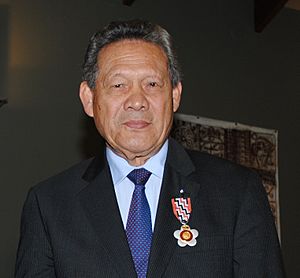Joe Williams (Cook Islands politician) facts for kids
Quick facts for kids
Joe Williams
QSO
|
|||||||||||||||||||||||||||||
|---|---|---|---|---|---|---|---|---|---|---|---|---|---|---|---|---|---|---|---|---|---|---|---|---|---|---|---|---|---|

Williams in 2011
|
|||||||||||||||||||||||||||||
| 7th Prime Minister of the Cook Islands | |||||||||||||||||||||||||||||
| In office 29 July 1999 – 18 November 1999 |
|||||||||||||||||||||||||||||
| Monarch | Elizabeth II | ||||||||||||||||||||||||||||
| Deputy | Norman George Tupou Faireka |
||||||||||||||||||||||||||||
| Queen's Representative | Apenera Short | ||||||||||||||||||||||||||||
| Preceded by | Geoffrey Henry | ||||||||||||||||||||||||||||
| Succeeded by | Terepai Maoate | ||||||||||||||||||||||||||||
|
|||||||||||||||||||||||||||||
| Member of the Cook Islands Parliament for Overseas |
|||||||||||||||||||||||||||||
| In office 24 March 1994 – 7 September 2004 |
|||||||||||||||||||||||||||||
| Preceded by | Iaveta Arthur | ||||||||||||||||||||||||||||
| Succeeded by | None (Constituency abolished) | ||||||||||||||||||||||||||||
| Personal details | |||||||||||||||||||||||||||||
| Born | 4 October 1934 Aitutaki, Cook Islands |
||||||||||||||||||||||||||||
| Died | 4 September 2020 (aged 85) Auckland, New Zealand |
||||||||||||||||||||||||||||
| Political party | Cook Islands Party | ||||||||||||||||||||||||||||
| Alma mater | Otago Medical School, University of Hawaii | ||||||||||||||||||||||||||||
Joseph Williams (born 4 October 1934 – died 4 September 2020) was an important Cook Islands politician and a skilled doctor. He served as the Prime Minister of the Cook Islands for about four months in 1999. He is well-known for his efforts to stop the spread of a tropical disease called filariasis, which is also known as elephantiasis. Dr. Williams lived mainly in Auckland, New Zealand, where he was a medical director at a health centre.
Contents
Early Life and Family Background
Joseph Williams was born on Aitutaki, one of the Cook Islands, on 4 October 1934. His family history connects him to William Marsters from Palmerston Island. In 1947, he moved to New Zealand. He received a special government scholarship, which allowed him to study at Northland College.
Medical Career and Achievements
Williams finished his medical studies at Otago Medical School in 1960. Later, he earned a Master's degree in Public Health from the University of Hawaii. In 1964, he went back to the Cook Islands. There, he worked as a medical leader, surgeon, and doctor. He also served as the Director of Health.
Dr. Williams did important research on tropical diseases, especially filariasis. He led health programs that helped the Cook Islands become a place where the World Health Organization (WHO) recognized that filariasis was no longer a major public health issue. He was also a member of the World Health Organization's executive board from 1995 to 1997. He continued to advise the WHO on eliminating filariasis until 2004. In 2002, the Cook Islands Government suggested that Williams should lead the World Health Organization, but this did not happen.
Political Career and Leadership
Williams first became a member of the Cook Islands Parliament in the 1968 election. He represented the area of Aitutaki for the Cook Islands Party. From 1974 to 1978, he was the Minister of Health and Education under Prime Minister Albert Henry. He also served as Henry's personal doctor.
After some time, Williams moved to New Zealand. He later rejoined the Cook Islands Party. In the 1994 election, he was re-elected to Parliament. This time, he represented the overseas seat, which was for Cook Islanders living outside the islands, mostly in New Zealand. From 1994 to 1996, he held several important roles, including Minister of Health, Tourism, Transport, and State-Owned Enterprises.
Even though he was part of the Cook Islands Party, he disagreed with the leadership of Geoffrey Henry, who was Prime Minister from 1989 to 1999. Many party members also disagreed with a deal the party made with the New Alliance Party. Because of these disagreements, Henry lost support and resigned.
In July 1999, Joseph Williams was chosen to be the new prime minister. This decision caused some debate because Williams lived mostly outside the Cook Islands. In October 1999, the New Alliance Party left the government, meaning Williams's government no longer had enough support. The next month, he lost a vote of no-confidence. Terepai Maoate then became the new prime minister. Williams lost his seat in Parliament in 2003 when the overseas electorate was removed.
Williams later tried to enter politics in New Zealand. He ran as a candidate for the New Zealand First party in the 2005 elections. He did not become a Member of Parliament in New Zealand. Before the 2017 New Zealand general election, he started a group called the One Pacific Movement. This group worked with the Māori Party to help Pacific candidates run for election.
Awards and Recognition
Joseph Williams received several awards for his service.
- In 1977, he was given the Queen Elizabeth II Silver Jubilee Medal.
- In 2004, he received the Pasifika Medical Association Service Award.
- In 2011, he was appointed a Companion of the Queen's Service Order. This award recognized his important contributions to the Cook Islands community.
- In 2015, he became the first Patron of the Pasifika Medical Association.
- In 2016, the World Health Organization gave him an Award of Appreciation for his work in eliminating lymphatic filariasis.
Later Life and Passing
On 13 August 2020, Joseph Williams was admitted to a hospital in Auckland. He had tested positive for COVID-19 during the COVID-19 pandemic in New Zealand. He sadly passed away from the virus on 4 September 2020, at the age of 85.
See also
 In Spanish: Joe Williams (político) para niños
In Spanish: Joe Williams (político) para niños
 | Georgia Louise Harris Brown |
 | Julian Abele |
 | Norma Merrick Sklarek |
 | William Sidney Pittman |

